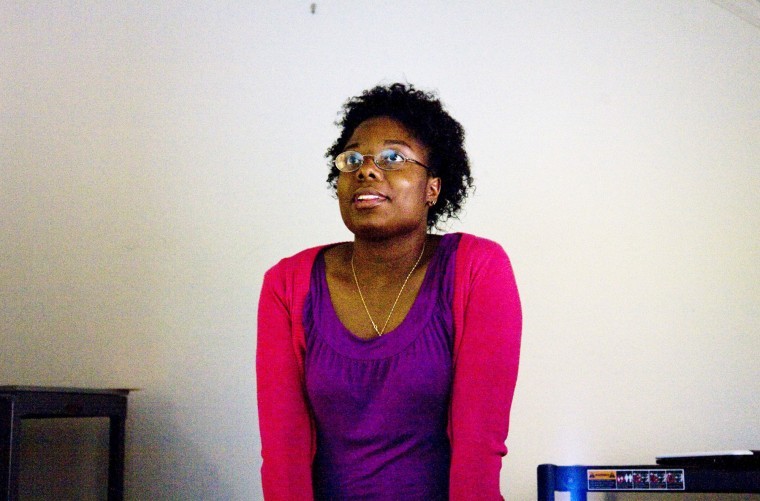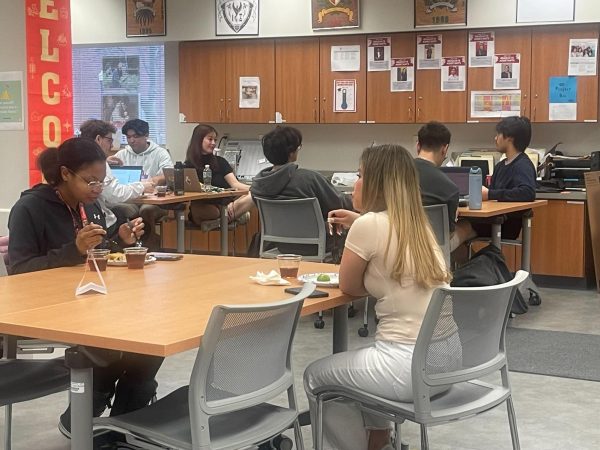The world’s the limit
Victoria Toussaint, interim outreach and programming coordinator for the Study Abroad Office, speaks during a session of Study Abroad 101 Thursday afternoon in Williston Hall Room 417.
October 3, 2010
Katelan McCurdy, junior child development major, returned from Paris on Sunday. She will spend a week in Granada, Spain before making her way to Lagos, Portugal next weekend.
McCurdy is not backpacking through Europe. She is studying abroad at the University of Granada and receiving NIU credit for it.
The program is offered through International Studies Abroad, or ISA, an affiliate of the NIU Study Abroad Office.
Students choose to go through co-sponsored programs because they offer a larger variety of options than those that are put on by the university. NIU’s faculty-directed trips are shorter, offer only coursework specific to the sponsoring department and are only during school breaks, with the exception of a theater program in Russia, said Jill Vodden, interim program coordinator at the Study Abroad Office.
Through third-party providers, students can study for a semester or an entire academic year abroad. NIU has 15 affiliates that provide programs in 75 countries. Some of the most popular affiliate programs are Semester at Sea, CIEE, ISA and GlobaLinks Learning Abroad. A lot of programs offer language immersion, so they attract students with majors or minors in foreign language.
Students who go through co-sponsored programs experience a more extensive application process than those who travel with faculty-directed trips. They must complete both an application for NIU and for the third-party provider. The affiliate applications usually request official transcripts, an essay or personal statement, professor evaluations and an application fee.
Students going through a program that is not taught by NIU staff must make sure their credits transfer back to NIU. McCurdy said the hardest part of the application process was meeting with heads of departments and advisers to confirm that she would receive credit for the University of Granada’s courses.
“NIU adds a lot more work [to apply] than my program has on its own, but it is definitely worth it,” she said. “I love it so far.”
Students who cannot find what they are looking for in study abroad through NIU’s faculty-led programs or its affiliates have another option. One is to find a program through a non-affiliated sponsor.
To get this program approved for NIU credit, students must provide the office with information about it, such as the cost and what it covers, course information and a personal statement about why they want to go on that program rather than an affiliated one. The office also requests that students provide course syllabi and faculty information, if possible.
Vodden said that the office “wants to assess [the program] just to make sure it meets the same standards as our approved programs.”
If approved, the student “start[s] the whole application process just like any student going on the approved programs.”
The only countries for which students cannot receive NIU credit are those on the U.S. Department of State Travel Warning list. Among others, Mexico, Colombia and Haiti are nations currently considered unsafe for travel.
Another option is to enroll directly in a foreign university.
Vodden said if a student is up for the challenge of researching a foreign university independently, applying directly to the university and arranging all their own housing, it can be cheaper than going through a provider.
A provider’s cost usually includes housing, food, tuition, excursions, advising and tutoring.
“Some of our affiliates have earmarked money for NIU students, so it’s easier in that regard,” said Victoria Toussaint, interim outreach and programming coordinator of the Study Abroad Office.
Students worry about funding, but the key is looking into studying abroad as soon as students know that they are interested to explore their options, Vodden said.
“It’s never too early, especially if you want to get the scholarships or grants,” Toussaint said.
Deadlines for funding are usually earlier than program application deadlines.
Toussaint and Vodden encourage students considering studying abroad to stop into the office, located in Williston Hall Room 417. There, students can fill out an advising questionnaire to assess their interests or find major-specific sheets that list third-party program providers by country.
The Study Abroad office is holding a program for students who want to learn how to find money for their trip from 5 p.m. to 6:30 p.m. Thursday in the Campus Life Building Room 100.













